|
July, 2005
Aug. 2005
Sept. 2005
Oct. 2005
Nov. 2005
Dec. 2005
Jan. 2006
Feb. 2006
Mar. 2006
Apr. 2006
May 2006
June 2006
July 2006
August 2006
September 2006
October 2006
November 2006
December 2006
January 2007
February 2007
March 2007
April 2007
May 2007
June 2007
July 2007
August 2007
September 2007
October 2007
November 2007
December 2007
February 2008
March 2008
April 2008
May 2008
June 2008
July 2008
August 2008
September 2008
October 2008
November 2008
December 2008
February 2009
March 2009
April 2009
May 2009
July 2009
August 2009
September 2009
November 2009
December 2009
January 2010
February 2010
March 2010
April 2010
May 2010
June 2010
July 2010
September 2010
October 2010
November 2010
December 2010
January 2011
February 2011
March 2011
April 2011
May 2011
June 2011
July 2011
September 2011
October 2011
December 2011
February 2012
April 2012
June 2012
July 2012
August 2012
October 2012
November 2012
February 2013
May 2013
July 2013
August 2013
October 2013
November 2013
April 2014
July 2014
October 2014
March 2015
May 2015
September 2015
October 2015
November 2015
August 2016
March 2017
January 2019
May 2019
August 2019
March 2020
April 2020
May 2020
July 2020
October 2020
January 2021
February 2021
August 2021
January 2022
February 2022
April 2022
June 2022
August 2022
September 2022
December 2022
ČERVENÁ BARVA PRESS NEWSLETTER
Gloria Mindock, Editor Issue No. 113 February, 2023
INDEX
Cervena Barva Press February Newsletter, 2023
Hi everyone-
Hope to see some of you at AWP in Seattle. Cervena Barva Press will be at table T403.
We will be hosting 3 book signings and have the official release of the following books:
Bathed in Moonlight by Vassiliki Rapti Translated from the Greek by Peter Botteas
Saying Goodbye by Andrew Stancek (Flash-Fiction)
Heaven with Others by Barbara Molloy
Renuka Raghavan and I will be reading off-site for Unlikely Books.
We are very excited about this. Here is the information for you:
Saturday, March 11, Unlikely Stories Mark V and Rigorous will team up with the fantastic folks
at Hanging Loose Press to present an awesome, three-hour poetry reading with many of your favorites!
This will be from 1pm to 4pm at the Vermillion Art Gallery and Bar at 1508 11th Avenue in Seattle!
Readers will include John Wall Barger, Martine Bellen, Carol Dorf, Gerald Fleming, Joanna Fuhrman, Kenning JP García,
Martha Jackson Kaplan, Cecilia Martinez-Gil, Laura Mattingly, Gloria Mindock, Renuka Raghavan, Thaddeus Rutkowski,
Rone Shavers, Rats Alice Trujillo, Dana Venerable, and Marc Vincenz!
This schedule is not finalized, and more names will likely appear!
We also are excited to announce the release of the following 4 books.
You can purchase these books at:
http://www.thelostbookshelf.com/index.html
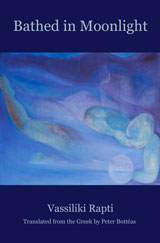
Bathed in Moonlight by Vassiliki Rapti
Translated from the Greek by Peter Botteas
Video link for Bathed in Moonlight by Vassiliki Rapti, Translated by the Greek by Peter Botteas
https://youtu.be/9CG9-Dx5IkA
|
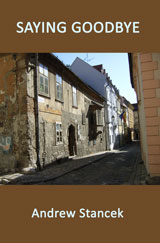
Saying Goodbye
by Andrew Stancek (Flash-Fiction)
|
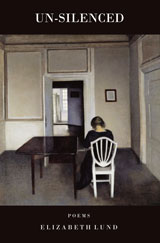
Un-Silenced poems by Elizabeth Lund
Video link for UN-SILENCED by Elizabeth Lund
https://youtu.be/CHmRiWwJzB0
|
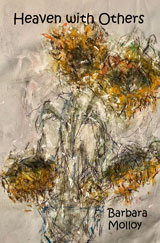
Heaven with Others
by Barbara Molloy
|

We have so many reviews out this month. How exciting!
Thank you to the reviewers for all their hard work on these.

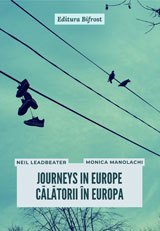
Journeys in Europe/Calatori In Europa
by Neil Leadbeater/Monica Manolachi
Review by John Riley
This is an intriguing book by design. Written in both English and Romanian by two separate authors,
it is a near perfect way to create a book of poems about two of Europes biggest rivers and journeys
down each. As the authors state in the preface, "River connect people and places" and the use of two
languages, one Germanic and the other Romance, presents an equally embracing means of exploring these
poems as they explore the Rhine and the Danube.
Centering the poems around the Danube and the Rhine provides a way to include different European
cultures. The first poems highlight apects of different cities on the Rhine-Delft, Rotterdam-and more.
But the poems aren't travelogues. They focus on specifics, such as the bombing destruction Nijmegen suffered
during World War II and the fashon house Konigsalle in Dusseldorf
Welcome to the home of high fashion....
expensive shops, luxury boutiques
but being in such a commercial place eventually wears one down
Already we are in "overload"
-it's another German metropolis
with too much to take in-
The suggestion is that the large metropolises have replaced their hearts for growth. The fashion house is booming,
but the city has been left behind.
It is different on other parts of the Rhine. In "The river in a convex mirror"
You marvel at its curved reflecting surface,
how it bulges its song-sides
running toward the light,
distorting the shape of well-wrought urns
to provide a wider view.
Ashbery would have loved it.
The last line is a reference to John Ashbery's long and groundbreaking poem "Self-Portrait in a Convex Mirror,"
but beyond the Ashbery reference it is a continuous look at how the Rhine may be once it also escapes the
cities. To relay this more gentle part of the Rhine, there is a light reference to Keats, who famously
placed beauty at the heart of his work.
The second part of the book looks at the Danube and perhaps my favorite poem is "The fox of Fridingen"
"Hunter you have put me outside your hotel
as a warning of the dangers of winter"
and from this the fox registers its complaints
"you did not ask me whether I agree
you sawed the ice around my body"
but it matters little because the fox is
"the music of nature... I dance in the bright moonlight."
As the Danube flows east, the poems follow its journey. In "Swimming lesson in Eselnita" the narrator
remembers trying to teach herself how to swim in the Danube:
I jumped in the cove with a shout of joy.
Suddenly, I tried to shriek,
but the artful water was much louder
and snatched me with its cold arms.
Dark blue death was smiling
at the bottom like a moody rag doll.
The river is hypnotic and flows and brings culture to many places, but it also a beast that can turn on one.
The water is "artful" but artful means both having good taste and being clever in a crafty way.
The choice of "artful" is an example of how skillfully the authors use language.
I do not read Romanian and am only able to comment on the language of the English language poems, but
I feel assured the Romanian originals and translations are equally beautiful. Although the language is a
mystery to me, even my pitiful attempts to sound out the words reveal the music.
Journeys in Europe/Calatori In Europa is a grand experiment that works. We journey through
Central Europe into Eastern Europe with stops along the way as the authors manage to startle us with
insights and immerse us in memories. The double author perspectives creates a new way to see Europe
and one that fits our increasingly smaller world. I am glad to have read it and recommend it to
any reader longing for poetry that grows naturally out of the world.

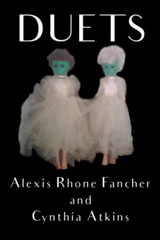
DUETS by Alexis Rhone Fancher & Cynthia Atkins
Review by Susan Isla Tepper
Take a closer look at these two little dolls all decked out in feminine finery. Or, is it the same cutie-pie, one
and the same, but decades later, hair gone to white, less frill and fluff to her ballet gown and slightly receded
in the frame.
Two of our finest poets working today have collaborated on this book titled DUETS, and though they may be punching
their stuff out on the same subject matter, the individual results couldn't be more, well, singular. It brought to
mind the two young sisters onstage in GYPSY, belting it out for Mama Rose while the girls were truly as different
as night and day.
This collection is fresh and enticing. Mesmerizing. Reading the work back-to-back was an indulgent treat.
DUETS opens with its first tandem as an homage to artist Edward Hopper. Two homages. Two voices singularly felt.
Alexis Rhone Fancher's "WE ARE ALL HOPPER PAINTINGS NOW" (after Jonathan Jones, The Guardian, UK (27 March 2020)
"That's me, solo table at The Automat, staring into a cold cup of tea; me, just out
of frame, driving up the lonely pump jockey in Gas. My sister says I have a "bad
picker," that my type (well-hung and irresponsible) is very bad for me, and she's
right. I wouldn't know a good guy if he snatched me up off the street in broad
daylight, I tell her.../..."
While on the contrasting page Cynthia Atkins offers work that is vastly different in style and tone from the Rhone Fancher poem.
DIMINUTION, 11 AM (after Edward Hopper)
"Blue to yellow, the voice told me
not to bathe. The voice said the window
is a guardrail. Said today is just like tomorrow.
There is no safety from the noise
and the sorrow of birds. Told me to sit
very still, like a red clay pot on a shelf.../..."
Both poets have zeroed in on the deep sensual/sexual component that drives Hopper's paintings.
Beautiful, as they are strange. Discomforting at times, totally relatable during other moments.
Is it Hopper or is it the viewer pulling the strings? And, what about the poems? Who is
controlling their individual landscapes?
On a more contemporary theme of love and its mortifications by Alexis Rhone Fancher:
FRIDAY NIGHT AT THE CANDLELIGHT LOUNGE
"She was better than I expected, hunched over the mic, arms and
legs entwined with the silver stand like she was f**king it. My ex-
lover Pete said she sang jazz ballads mostly, throaty and low.
Almost like Billie, he said, how she lagged behind the beat, her
voice catching on the blue notes.../..."
Then Cynthia Atkins' counterpoint poem CRICKETS:
"In all these days and years, the only thing
I've learned is a poem needs an engine.
Not a newscaster with ski-slope hair but colorful
sweaters from old dead aunts, penumbra of dust motes,
crumpled Kleenex, the frayed edges of gossip.../..."
The chosen topics for the 'duets' are varied, timely and eclectic. Cynthia Atkins wrote the sensitive FOREWORD.
The photos, that appear almost randomly, like pop-ups, come from the magical lens of Alexis Rhone Fancher.

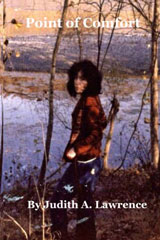
POINT OF COMFORT, a Memoir by Judith A. Lawrence
Review by Susan Isla Tepper
Picture yourself in a modest comfy kitchen, seated across the table from your friend, two women of a certain age
drinking tea from her pretty china cups, winter sunlight flooding the room as she begins to tell you the story of
her life. Up until the age of three her life was fairly ordinary.
"If it hadn't been for my sister Mary's muffled cry, I might not be here to tell this story. It was early winter in
the year 1944. I was three and a half, my sister would soon be five. In an old brownstone three story apartment
house in Center City Philadelphia we were playing with a dozen kids of various ages inside the front door hallway.
One of the older boys threw a lit match into the large trash filled bin when the contents went up in flames.
The older kids commanded "Run!"
Mary and I locked hands and ran two flights up to our apartment crawl space where we often played with our toys
in back of the bedroom closet... The heavy sound of boots approached the closet we were hiding in... The closet
door sprung open and two firemen peered in..."
Outside the building the little girls were put into the back seat of a car. Out the rear window they spotted
their mother rushing toward the burning building with sacks of groceries in her arms. Pounding on the window
they screamed "Mommy" but she never heard them. The firemen, probably assuming they were just crying out for
their mother, sped off.
Judy and Mary spent that night sleeping on a bench in the firehouse. The next day they were driven to
The Catholic Bureau of Philadelphia and registered into the foster care system.
If ever a tragedy could have been averted!
There were many foster homes for these two girls growing up. Fortunately, the very first was a warm and
wonderful Italian household, just a husband and wife who gave the girls a real life and sense of purpose.
But older age, illness and finally death put an end to that and they were moved to another, then a series of
foster homes. Some were fair to middling, some were truly horrible.
The author examines these circumstances and how they informed both her's and Mary's lives. Many, many people
came into the picture, some good and some hideous. Judy had four children that she managed to keep with her
despite poverty and some very dicey marriages. She is a survivor in the truest sense. Some people buckle under
this type of pressure, while others face up to it with a clarity that is both striking and admirable. She saw
her mother a few times in her younger years, but promises from the mother did not reunite them. She tried
valiantly to reunite with her birth father which also did not come to fruition.
Judy managed to gain access to higher education, and despite terrible odds, she went on to live an extremely
creative and productive life, adoring her children and many grandchildren. She made the life that was taken
from her. I simply could not put this book down.

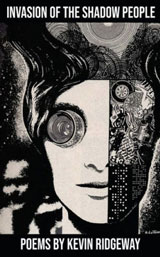
INVASION OF THE SHADOW PEOPLE by Kevin Ridgeway
Review by Miles Tepper
In Kevin Ridgeway's disturbingly powerful poetry collection Invasion of the Shadow People, he invites the reader
into the nightmarish world of a dysfunctional childhood, family and young adulthood in language spare and harsh,
yet fully appropriate to the story that literally cascades off each page:
"My father never taught me anything
other than how to saw women in two
with electric charisma that leaves us
both daydreaming in separate prisons
and all of them dying while waiting
for us to join them on the outside."
(From "Toxic Masculinity")
Apparently autobiographical, his poetry is largely narrative, yet with an innate sense of when to use
(albeit sparingly) poetic imagery and metaphor, which manages a peculiarly sympathetic quality, keeping
the narrative from being overwhelmingly too terrible, filled as it is with the horrors of prison, drugs
and other dismal events in his and his family's lives. Nobody is spared, especially his mother and father:
"It started when I was growing up
with a neat freak mother
all those Tuesdays when she blamed
her drill sergeant personality switch on PMS
and forced me to help her scrub out the filth
until I could see my ten year old reflection in it"
(From "Double Scrub")
It's not easy to write nearly 100 poems on the subject of a life spent largely in abject misery, but this
poet manages to do it with such consummate skill and variety, that the reader will be engaged from cover to cover.

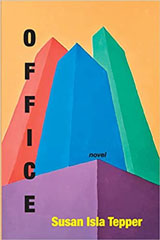
Office by Susan Tepper/Book Trailer
Video link: https://youtu.be/IZsS_d_Jvdw
Could you tell us about choosing the setting of OFFICE, in an empty office in New York City?
The pandemic was rolling when I decided to write another book, to quell my fears. My ideas come out of the
ether, mainly. But hard truths laid the groundwork for this particular novel. However, I wasn't about to write
hard truths. Say you are in the midst of a war, do you hunker down in a bomb shelter and write a war novel?
Unlikely. Afterward, maybe, but not during the shelling. We have shelling of a different sort: a puff of air
that's killed an awful lot of people. So I write my book OFFICE but turned it into satire. A small group of
office workers who were riding it out as best they could in that tall, mostly empty building. NYC was
like that during the lockdown. Though some people still braved it into the office. In my little group
of characters you have the good, the bad and the ugly. You have competitive behavior. The same way
life is always arranged. The book gets pretty zany, because zany made me feel better about everything
that was terrifying me.
What does the book say about today's times?
I think it's saying that no matter what's going on with the world, people will retain their same personalities and
character traits, and operate along the same lines as they've always done. And that a huge scare like a pandemic
doesn't transform a dirty rotten scoundrel into a hero, or a psycho-bitch into a Mother Teresa.
When did you begin writing, Susan? Were you writing at an early age?
Oh, gosh, I started really late. When I gave up my acting life. My mom was a published poet and humor writer,
and she encouraged me. My whole life I've been a voracious reader so it wasn't hard to transition from acting to
writing. They're both art and deal in words. Just from different perspectives. I do write stage plays, too, and
recently had my play THE CROOKED HEART debut at the Irish Rep in NYC on October 25. It was a blast, and I worked
closely with a director I really admire, Elmore James.
Any favorite authors?
I'm reading down the entire works of Edna O'Brien, Graham Greene, W. Somerset Maugham. Last year it was Camus and
James Baldwin, William Trevor, Hemingway, Richard Yates. The poet Louise Gluck. My appetite for what these genius
writers put on the page is voracious.
How do you create such interesting characters in your books?
John, I'm so glad you find them interesting. I think most people are interesting, and I tend to absorb things from
people. It's part of my acting training, or maybe I was born inquisitive. At any rate, if you walk around half-asleep
to what's going on around you, what can you possibly bring to the page or the stage? Art always co-mingles with life.
What will your next book be about?
My next novel is already written. It's about a young woman who lives down South and busts out of her mundane life.
Any future plans and projects?
I have to get a full run for my play. I'm always writing. I'm sure the books will keep coming out until they put me 6 feet under.
Thanks for these great questions, John.

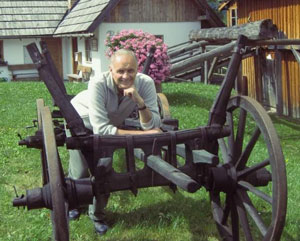
Constantin Severin is a Romanian writer and visual artist, founder and proponent of Archetypal Expressionism,
a highly regarded global art movement, which he founded in Bukovina, in 2001. A graduate of the International
Writing Program at the University of Iowa, he has published 14 books of poetry, essays and fiction. One of his
poems was included in the 2014 World Literature Today anthology, After the Wall Fell: Dispatches from
Central Europe (1989-2014), aimed at popularizing post-Wende Central European literature on the
twenty-fifth anniversary of the fall of the Berlin Wall. In 2022 he won the International Poetry Award
"Aco Karamanov" in Northern Macedonia, for the English version of the manuscript of the poetry book
"The Lives of the Painters." Severin's poems and artworks have appeared in World Literature Today,
Trafika Europe, Artdaily, The Poet, It's Liquid, Kiev, Levure litteraire, Empireuma, Contemporanul,
Rast, Vatra, Arkitera, Independent Poetry, Cuadernos del Ateneo, Dance, Media Japan, and other
international art and literary magazines.
Website: http://constantinseverin.ro/
WE NEVER WAITED FOR THE BARBARIANS
we never waited for the barbarians
we retreated silently into the woods and mountains
after setting fire to the grain we poisoned the wells and tore down
bridges and watchtowers
without looking back at the swirling horizon
we never waited for the barbarians
we built our shadows on the walls of houses and in the bibles
and we took with us all the words and stories
an endless series of lived and unlived lives
without looking back at the swirling horizon
we never waited for the barbarians
we adorned our souls with longing and hope
with the music of the seen and unseen worlds
and we delved into ourselves till we reached the last drop of blood
without looking back at the swirling horizon
we never waited for the barbarians
we abandoned ourselves to the light woven from horsehair
seeking the being of language in the being of nature
and unreal eyes hidden in real eyes
without looking back at the swirling horizon
we never waited for the barbarians
we raised our tears and dreams
and were overwhelmed by the warm ethereal utterances
within the incandescent whispers of love and death
without looking back at the swirling horizon
we never waited for the barbarians
and yet the prophets and the wise tell us
they have been with us for a long time
Suceava, June 26, 2020
English version by Constantin Severin & Slim FitzGerald

Červená Barva Press Staff
Gloria Mindock, Editor & Publisher
Flavia Cosma, International Editor
Helene Cardona, Contributing Editor
Andrey Gritsman, Contributing Editor
Juri Talvet, Contributing Editor
Renuka Raghavan, Fiction Reviewer, Publicity
Karen Friedland, Interviewer
Gene Barry, Poetry Reviewer
Miriam O' Neal, Poetry Reviewer
Annie Pluto, Poetry Reviewer
Christopher Reilley, Poetry Reviewer
Susan Tepper, Poetry Reviewer
Neil Leadbeater, Poetry Reviewer
John Riley, Poetry and Fiction Reviewer
William J. Kelle: Webmaster
Gene Barry (In Memoriam)
See you next month!


If you would like to be added to my monthly e-mail newsletter, which gives information on readings,
book signings, contests, workshops, and other related topics...
To subscribe to the newsletter send an email to:
newsletter@cervenabarvapress.com
with "newsletter" or "subscribe" in the subject line.
To unsubscribe from the newsletter send an email to:
unsubscribenewsletter@cervenabarvapress.com
with "unsubscribe" in the subject line.

Index |
Bookstore |
Our Staff |
Image Gallery |
Submissions |
Newsletter |
Readings |
Interviews |
Book Reviews |
Workshops |
Fundraising |
Contact |
Links
Copyright @ 2005-2023 ČERVENÁ BARVA PRESS - All
Rights Reserved
|

